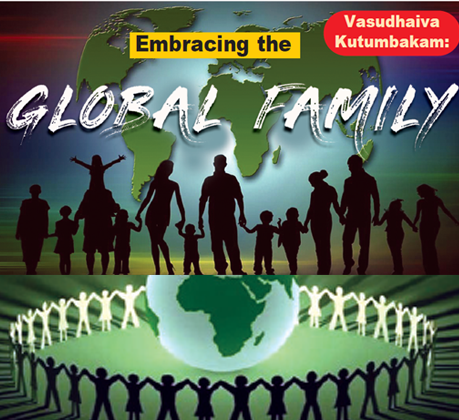Vasudhaiva Kutumbakam:
In the timeless wisdom of ancient Indian philosophy, the concept of Vasudhaiva Kutumbakam emerges as a profound testament to the interconnectedness of all life. Translated as “the world is one family,” this ancient Sanskrit phrase
encapsulates a universal ethos of unity, compassion, and inclusivity. Delving into the significance of Vasudhaiva Kutumbakam unveils a vision of global harmony that transcends boundaries of race, religion, and nationality, weaving together
the threads of humanity into a vibrant tapestry of oneness. The roots of Vasudhaiva Kutumbakam can be traced back to the sacred texts of ancient India, including the Vedas, Upanishads, and Mahabharata. The concept finds mention in the Maha
Upanishad, where it is extolled as a guiding principle for righteous living and social harmony. The idea is deeply ingrained in Hindu, Buddhist, and Jain philosophy, reflecting a profound understanding of the interconnected nature of
existence. At its core, Vasudhaiva Kutumbakam emphasizes the fundamental unity of all beings, transcending the divisions of caste, creed, and nationality. It recognizes that the same divine essence animates all life forms, from the smallest
insect to the highest deity, and calls upon humanity to honor and respect this intrinsic interconnectedness. Central to the ethos of Vasudhaiva Kutumbakam is the cultivation of universal brotherhood and compassion towards all beings. It
encourages individuals to extend the circle of their empathy beyond the confines of kinship and nationality, embracing the entire world as their own family. In the words of Mahatma Gandhi, “The world is my family, all mankind are my
brethren, and to do good is my religion.” Through acts of kindness, generosity, and selflessness, practitioners of Vasudhaiva Kutumbakam seek to alleviate the suffering of others and promote the welfare of all sentient beings. The
philosophy teaches that true happiness and fulfillment are found not in the pursuit of selfish desires but in the service of others and the greater good. One of the most profound aspects of Vasudhaiva Kutumbakam is its celebration of
diversity within the framework of unity. It recognizes that the world is populated by a rich tapestry of cultures, languages, and traditions, each contributing to the mosaic of human experience. Rather than viewing diversity as a source of
division, the philosophy sees it as a source of strength and enrichment.
Just as the various limbs of the body function harmoniously together, despite their differences in form and function, so too should humanity strive to coexist in peace and harmony, respecting and celebrating the uniqueness of each
individual and community. Vasudhaiva Kutumbakam calls upon us to transcend the narrow confines of tribalism and ethnocentrism, embracing the vast tapestry of human diversity with open hearts and minds. Economically, Vasudhaiva Kutumbakam
advocates for equitable distribution of resources and opportunities, ensuring that no individual or community is left behind in the pursuit of prosperity. In the realm of international relations, it promotes dialogue, cooperation, and
mutual understanding among nations, fostering a climate of peace and cooperation on the global stage. While the philosophy of Vasudhaiva Kutumbakam offers a compelling vision of global unity and harmony, it also confronts numerous
challenges in the modern world. The forces of nationalism, tribalism, and sectarianism continue to divide humanity, fueling conflict, hatred, and intolerance. Moreover, issues such as poverty, inequality, and environmental degradation
threaten the wellbeing of people around the world, highlighting the urgent need for collective action and solidarity. However, in the face of these challenges, Vasudhaiva Kutumbakam offers a ray of hope, reminding us of our shared humanity
and our capacity to overcome adversity when we stand united. In an increasingly interconnected and interdependent world, the philosophy of Vasudhaiva Kutumbakam resonates with greater relevance and urgency than ever before. It calls upon us
to transcend the illusions of separation and division, recognizing that we are all members of the same global family, bound together by the bonds of love, compassion, and common destiny. As we navigate the complexities of the modern world,
let us heed the timeless wisdom of Vasudhaiva Kutumbakam, striving to live in harmony with all beings and to cultivate a culture of peace, compassion, and solidarity. In embracing the global family as our own, we honor the divine spark that
resides within each and every one of us, and we pave the way for a brighter and more compassionate world for generations to come.
The principles of Vasudhaiva Kutumbakam find practical application in various spheres of human endeavor, including politics, economics, and international relations. In the political realm, it calls for the establishment of governance
systems that prioritize the welfare of all citizens, irrespective of their background or beliefs.

















Add Comment